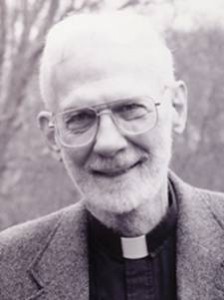 |
| Robert Farrar Capon, 1925-2013 |
Though he described himself as a “high churchman” and a “Thomist,” he was more simply a Protestant Episcopalian of the rather classic variety. His summation of the Reformation certainly showed it:
The Reformation was a time when men went blind, staggering drunk because they had discovered, in the dusty basement of late medievalism, a whole cellar full of fifteen-hundred-year-old, two-hundred proof Grace–bottle after bottle of pure distilate of Scripture, one sip of which would convince anyone that God saves us single-handedly. The word of the Gospel–after all those centuries of trying to lift yourself into heaven by worrying about the perfection of your bootstraps–suddenly turned out to be a flat announcement that the saved were home before they started…Grace has to be drunk straight: no water, no ice, and certainly no ginger ale; neither goodness, nor badness, not the flowers that bloom in the spring of super spirituality could be allowed to enter into the case.
This made me laugh and cry at the same time.
Here is another:
To raise a glass, however, is to raise a question. One honest look at any real thing—one minute’s contemplation of any process on earth—leads straight into the conundrum of the relationship of God to the world. The solution is hardly obvious. For something that could not be at all without God, creation seems to do rather well without Him. Only miracles are simple; nature is a mystery. Autumn by autumn, He makes wine upon a thousand hills, but He does it without tipping His hand. Glucose, fructose, and Saccharomyces ellipsoideus apparently manage very nicely on their own. So much so, that the resolving of the conflict between the sacred and the secular (or, better said, the repairing of the damage done by divorcing them) has been billed as the major problem of modern theology. Permit me, therefore, glass in hand and cooking Sherry within easy reach, the world’s most interrupted discourse on the subject. In vino veritas.
Take the largest part of that truth first. God makes wine. For all its difficulties, there is no way around the doctrine of creation. But notice the tense: He makes; not made. He did not create once upon a time, only to find himself saddled now with the unavoidable and embarrassing result of that first rash decision. That is only to welsh on the idea of an unnecessary world, to make creation a self-perpetuating pool game which is contingent only at the start—which needs only the first push on the cue ball to keep it going forever. It will not do: The world is more unnecessary than that. It is unnecessary now; it cries in this moment for a cause to hold it in being. It was St. Thomas, I think, who pointed out long ago that if God wanted to get rid of the universe, He would not have to do anything; He would have to stop doing something. Wine is—the fruit of the vine stands in act, outside of nothing—because it is His very present pleasure to have it so. The creative act is contemporary, intimate, and immediate to each part, parcel and period of the world.
Do you see what that means? In a general way we concede that God made the world out of joy: He didn’t need it; He just thought it was a good thing. But if you confine His activity in creation to the beginning only, you lose most of the joy in the subsequent shuffle of history. Sure, it was good back then, you say, but since then, we’ve been eating leftovers. How much better a world it becomes when you see Him creating at all times and at every time; when you see that the preserving of the old in being is just as much creation as the bringing of the new out of nothing. Each thing, at every moment, becomes the delight of His hand, the apple of His eye. The bloom of yeast lies upon the grapeskins year after year because He likes it; C6H12O6=2C2H5OH+2CO2 is a dependable process because, every September, He says, That was nice; do it again.
The Preeminence of Christ
He is the image of the invisible God, the firstborn of all creation. For by him all things were created, in heaven and on earth, visible and invisible, whether thrones or dominions or rulers or authorities—all things were created through him and for him. And he is before all things, and in him all things hold together. And he is the head of the body, the church. He is the beginning, the firstborn from the dead, that in everything he might be preeminent. For in him all the fullness of God was pleased to dwell, and through him to reconcile to himself all things, whether on earth or in heaven, making peace by the blood of his cross (Colossians 1:15-20).
http://calvinistinternational.com/2013/09/06/rip-robert-farrar-capon/

Thanks for posting this, John. I really enjoyed it.
ReplyDeleteHi Ree, you're welcome. How are you doing?
DeleteHigh church and Thomism?
ReplyDeleteOn behalf of the Catholic Church - you're welcome. ;)
I'll concede that Thomas got some things right; but he also swallowed whole fakers and forgers like Pseudo-Dionysius and the Pseudo-Isidore decretals, meaning his work as a whole needs to be questioned and verified before it can be accepted.
DeleteHi John,
ReplyDeleteI'm well, thanks. How about you? It would be good to hear updates on your family and all. You still have my email, right?